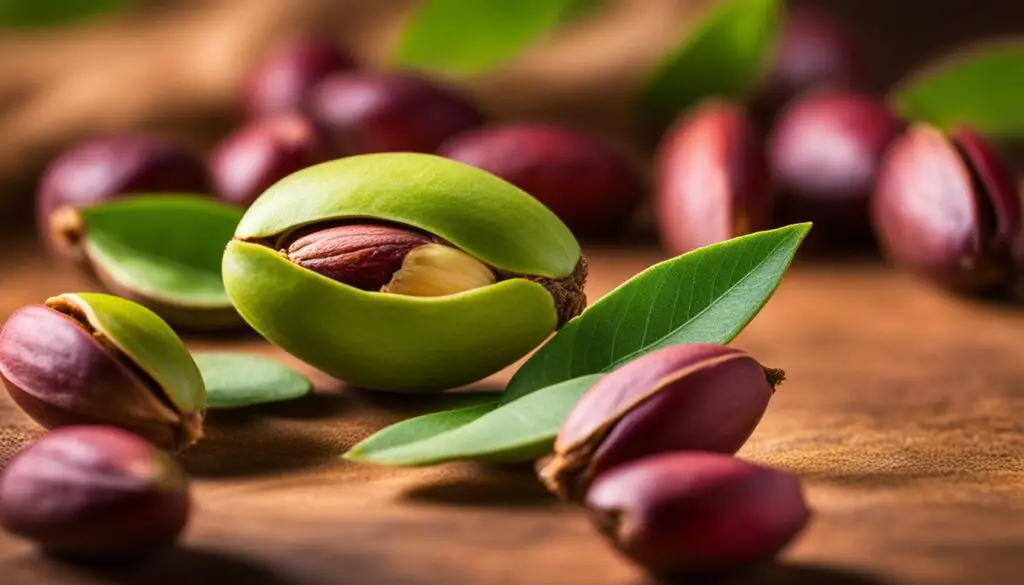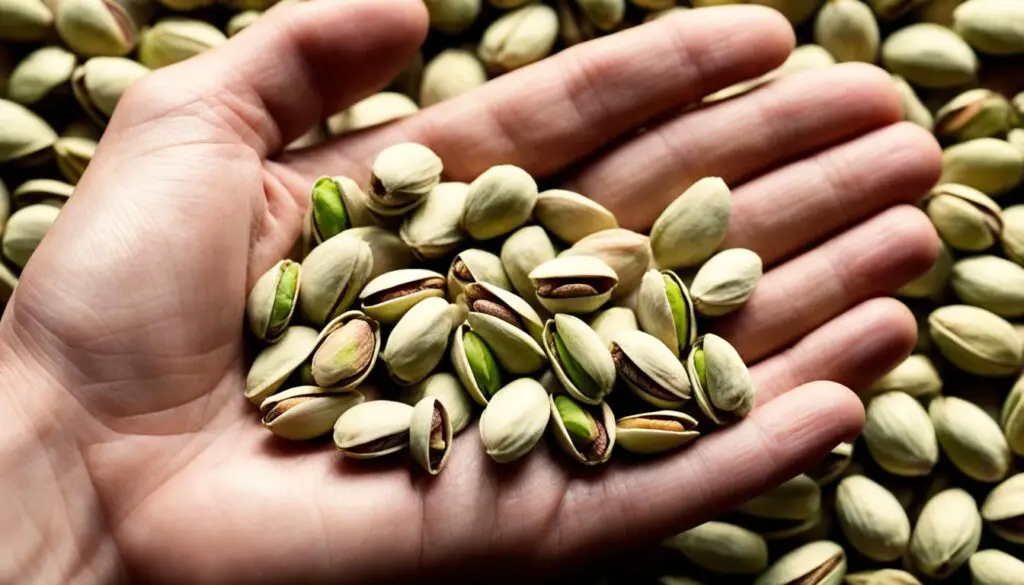Pistachios are not only delicious but also incredibly nutritious. They are packed with essential nutrients and offer a wide range of health benefits. From promoting heart health to aiding in weight management and boosting digestion, pistachios are a versatile snack that can enhance your overall well-being. Additionally, their high antioxidant content makes them beneficial for eye health and protection against chronic diseases such as diabetes and cancer.
Key Takeaways:
- Consuming pistachios can promote heart health, aid in weight management, and improve digestion.
- Pistachios are rich in essential nutrients such as protein, fiber, healthy fats, vitamins, and minerals.
- The antioxidants in pistachios contribute to eye health and protection against chronic diseases.
- Regularly including pistachios in your diet can support stable blood sugar levels and diabetes management.
- When enjoying pistachios, opt for unsalted varieties and practice portion control for optimal health outcomes.
Loaded with Nutrients
Pistachios are a nutritional powerhouse, providing a wide range of essential nutrients that are beneficial for your overall health. Let’s take a closer look at the nutritional value of pistachios and the various nutrients they offer:
| Nutrient | Benefits |
|---|---|
| Protein |
Pistachios are a good source of protein, which plays a crucial role in building and repairing tissues, supporting muscle development, and promoting satiety. Including protein-rich foods like pistachios in your diet can help you feel full for longer and curb cravings. |
| Fiber |
Pistachios are packed with dietary fiber, which is important for digestive health and promoting regular bowel movements. Fiber also helps control blood sugar levels, reduce cholesterol levels, and maintain a healthy weight. |
| Healthy Fats |
Pistachios contain heart-healthy fats, including monounsaturated and polyunsaturated fats. These fats help lower bad cholesterol levels, reduce inflammation, and support brain function. Including pistachios in your diet can provide a good source of healthy fats for optimal health. |
| Vitamins |
Pistachios are rich in various vitamins, with vitamin B6 being particularly noteworthy. Vitamin B6 is essential for brain development, immune function, and the production of hemoglobin in red blood cells. Incorporating pistachios into your diet can help ensure you meet your daily vitamin requirements. |
| Minerals |
Pistachios are a good source of minerals such as potassium, phosphorus, copper, and manganese. These minerals are important for maintaining healthy bones, regulating blood pressure, supporting proper nerve function, and promoting overall well-being. |
Incorporating pistachios into your diet can help ensure you are getting a diverse range of essential nutrients, including protein, fiber, healthy fats, vitamins, and minerals. These nutrients play vital roles in various bodily functions, such as regulating blood sugar levels, maintaining heart health, and supporting cognitive function.
“The nutritional value of pistachios makes them a delicious and nutritious addition to your diet. They are a great source of protein, fiber, healthy fats, vitamins, and minerals, all of which contribute to overall health and well-being.”
High in Antioxidants
Pistachios are packed with antioxidants, which play a crucial role in protecting your cells from oxidative damage. These powerful compounds help fight the harmful effects of free radicals and contribute to overall health and well-being. Antioxidants are essential for reducing inflammation, supporting a strong immune system, and preventing chronic diseases.
In addition to their impressive antioxidant content, pistachios contain specific antioxidants that are particularly beneficial for eye health. Lutein and zeaxanthin, two carotenoids found in pistachios, have been shown to have protective effects on the eyes.
Benefits of Antioxidants for Eye Health
The antioxidants present in pistachios, including lutein and zeaxanthin, can have significant benefits for eye health. These antioxidants play a vital role in preventing age-related macular degeneration (AMD), a common vision problem that can result in vision loss. AMD occurs when the macula, a small part of the retina responsible for central vision, deteriorates over time.

Lutein and zeaxanthin help protect the macula by filtering blue light and reducing oxidative stress in the eyes. Blue light exposure, especially from digital devices and artificial lighting, can lead to cell damage and contribute to the development of AMD. The antioxidants in pistachios act as a shield, safeguarding the delicate tissues of the eyes from these harmful effects.
Incorporating pistachios into your diet can provide a natural and delicious way to boost your intake of antioxidants, supporting eye health and reducing the risk of vision problems. Enjoying a handful of pistachios as a snack or adding them to salads, smoothies, or baked goods can be a simple way to reap the benefits of these powerful antioxidants.
In conclusion, high in antioxidants, pistachios, particularly lutein and zeaxanthin, offer valuable support for eye health. Their protective properties against oxidative damage and blue light exposure make them a natural choice for maintaining healthy vision.
Aids in Weight Management
Achieving and maintaining a healthy weight can be challenging, but incorporating pistachios into your diet can help. These delicious nuts offer several benefits that support weight management.
Promotes Satiation with Protein and Fiber
Pistachios are a rich source of both protein and fiber, two nutrients that promote feelings of fullness and satisfaction after a meal or snack. Protein and fiber take longer to digest, helping to curb cravings and reduce overeating. By including pistachios in your meals or snacks, you can increase satiety and potentially reduce overall calorie intake.
Mindful Eating with Pistachios
Mindful eating is a practice that involves paying full attention to the present moment while eating, including the sensory experience, thoughts, and feelings associated with eating. Choosing pistachios as a snack can support mindful eating as they require time and effort to shell. When you take the time to shell each pistachio, you slow down the eating process and provide an opportunity to savor and fully enjoy each nut.
Portion Control with In-Shell Pistachios
Another benefit of choosing in-shell pistachios is that they can help with portion control. Research suggests that by seeing the empty shells pile up as you eat, you can visually gauge your level of consumption. This visual cue can help prevent mindless snacking and encourage mindful portion sizes.

When it comes to weight management, incorporating pistachios into your diet can be a smart choice. The combination of protein and fiber promotes satiety, while mindful eating and portion control with in-shell pistachios contribute to a more balanced approach to eating. Enjoy pistachios as a satisfying snack or incorporate them into your favorite recipes for a nutritious boost.
Supports Digestive Health
Pistachios are a great source of dietary fiber, which plays a crucial role in maintaining a healthy digestive system. The fiber content in pistachios helps promote regular bowel movements and supports overall gut health. Additionally, the fiber in pistachios acts as a prebiotic, nourishing the beneficial bacteria in your gut. This encourages the growth of a healthy gut microbiome, which is essential for optimal digestion and improved gut function.
Incorporating pistachios into your diet can have a positive impact on your digestive health. Regular consumption of pistachios can help prevent digestive disorders and support the overall well-being of your gastrointestinal system. The combination of fiber and other nutrients in pistachios makes them a nourishing and gut-friendly snack option.
| Nutrient | Amount per 1-ounce serving of pistachios |
|---|---|
| Calories | 156 |
| Protein | 6 grams |
| Dietary Fiber | 3 grams |
| Total Fat | 13 grams |
| Saturated Fat | 1.5 grams |
| Carbohydrates | 8 grams |
| Sugar | 2 grams |
| Calcium | 30 milligrams (mg) |
| Potassium | 291 mg |
| Iron | 1 mg |
Promotes Heart Health
Pistachios have numerous benefits for heart health. They contain compounds that can help lower bad cholesterol levels and increase good cholesterol levels, reducing the risk of heart disease. The high levels of antioxidants in pistachios support heart function and improve overall cardiovascular health. Additionally, pistachios are rich in potassium, which plays a crucial role in regulating blood pressure.
Studies have shown that consuming pistachios can have a positive impact on heart health. A clinical trial published in the Journal of the American Heart Association found that individuals who incorporated pistachios into their diets had lower blood pressure levels compared to those who did not.
“Pistachios have been shown to lower LDL cholesterol levels and increase HDL cholesterol levels, which can greatly reduce the risk of heart disease.” – Dr. Emily Lopez, Cardiologist
In addition to their cholesterol-lowering properties and blood pressure regulation, pistachios also provide a good source of monounsaturated fats, which can help improve heart health by reducing inflammation and improving blood vessel function.
To reap the heart health benefits of pistachios, it is recommended to include a handful (approximately 1 ounce or 30 grams) as part of a balanced diet. Enjoy them as a standalone snack, or incorporate them into your favorite salads, yogurt, or smoothies.
Pistachios and Heart Health Benefits
| Benefit | Explanation |
|---|---|
| Lower cholesterol levels | Pistachios contain phytosterols and fiber that can help lower LDL cholesterol levels and increase HDL cholesterol levels. |
| Regulate blood pressure | The potassium content in pistachios helps regulate blood pressure, reducing the risk of hypertension and cardiovascular disease. |
| Reduce inflammation | The monounsaturated fats in pistachios help reduce inflammation, improving overall heart health. |
Enhances Blood Sugar Control
Pistachios can be a valuable addition to a diabetic diet. Their low glycemic index, along with their fiber and protein content, helps stabilize blood sugar levels and promote better diabetes management.
The glycemic index (GI) is a scale that measures how quickly carbohydrates in food raise blood sugar levels. Foods with a low GI, like pistachios, cause a slower and more gradual increase in blood sugar compared to high GI foods. This is beneficial for individuals with diabetes as it helps prevent spikes in blood sugar levels, promoting stable glucose control.
The high fiber content in pistachios further aids in blood sugar management. Fiber slows down the digestion and absorption of carbohydrates, preventing rapid fluctuations in blood sugar levels. The soluble fiber found in pistachios forms a gel-like substance in the digestive tract, which helps regulate the release of glucose into the bloodstream.
In addition to fiber, pistachios also contain healthy fats and protein, which further contribute to stable blood sugar levels. Healthy fats and protein help slow down the digestion process, providing a sustained release of energy and preventing blood sugar spikes.
The antioxidants present in pistachios, such as vitamin E, also play a role in diabetes management. These antioxidants help reduce inflammation and oxidative stress, which are common complications associated with diabetes. By combating inflammation and reducing oxidative stress, pistachios can help improve insulin sensitivity and overall blood sugar control.
Incorporating pistachios into a well-balanced diabetic diet can provide numerous benefits in terms of blood sugar management and overall diabetes control. Whether enjoyed as a standalone snack or added to salads, yogurt, or smoothies, pistachios offer a delicious and nutritious way to support stable blood sugar levels.
Conclusion
Pistachios are not only a tasty snack, but they also offer a wide range of health benefits. By incorporating pistachios into your daily diet, you can enhance your overall well-being and support various aspects of your health.
One of the key health benefits of pistachios is their ability to support heart health. With their cholesterol-lowering properties and high antioxidant content, pistachios can help reduce the risk of heart disease. Additionally, their fiber and protein content can aid in weight management and promote feelings of fullness, making them an excellent choice for those watching their weight.
Pistachios also support digestive health due to their fiber content. They act as a prebiotic, nourishing the beneficial bacteria in your gut and promoting a healthy digestive system. Moreover, pistachios can help stabilize blood sugar levels, making them a valuable addition to a diabetic diet.
To incorporate pistachios into your diet, consider adding them to salads, yogurt, or smoothies, or enjoying them as a standalone snack. Remember to choose unsalted pistachios to avoid excessive sodium intake and practice portion control for optimal health benefits. With their delicious taste and numerous health benefits, pistachios are a wonderful addition to a balanced diet.
FAQ
What are the health benefits of pistachios?
Pistachios offer numerous health benefits, including promoting heart health, aiding in weight management, boosting digestion, and enhancing blood sugar control. They are also high in antioxidants, which support eye health and protect against chronic diseases like diabetes and cancer.
What nutrients are found in pistachios?
Pistachios are packed with essential nutrients, including protein, fiber, healthy fats, vitamins (such as vitamin B6), and minerals (including potassium, phosphorus, copper, and manganese).
How do pistachios benefit eye health?
Pistachios are rich in antioxidants like lutein and zeaxanthin, which are beneficial for eye health. These antioxidants can help prevent age-related macular degeneration and protect against damage caused by blue light.
Can pistachios help with weight management?
Yes, pistachios can aid in weight management. They are high in protein and fiber, which promote feelings of fullness and reduce overall calorie intake. Choosing in-shell pistachios can also encourage mindful eating and portion control.
How do pistachios support digestive health?
Pistachios are a great source of dietary fiber, which acts as a prebiotic and nourishes the beneficial bacteria in your gut. This promotes a healthy gut microbiome and supports regular bowel movements.
Do pistachios promote heart health?
Yes, pistachios have been shown to have numerous benefits for heart health. They can help lower bad cholesterol levels and increase good cholesterol levels, leading to a reduced risk of heart disease. The potassium content in pistachios also helps regulate blood pressure.
Can pistachios help with diabetes management?
Pistachios can be a valuable addition to a diabetic diet. They have a low glycemic index and the combination of fiber, protein, and healthy fats helps stabilize blood sugar levels. The antioxidants in pistachios also contribute to better blood sugar control by reducing inflammation and oxidative stress.
How can I incorporate pistachios into my diet?
You can enjoy pistachios in a variety of ways. Consider adding them to salads, yogurt, or smoothies, or simply enjoy them as a standalone snack. Remember to choose unsalted pistachios and practice portion control for optimal health outcomes.

